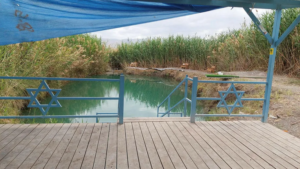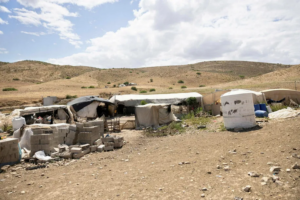Settlers and soldiers unite to deny Palestinians water in the West Bank’s Jordan Valley

A spring near Ein al-Beida, April 2025. The springs, on which the farmers’ livelihood depends, are being branded by the settlers as tourist attractions.
Zafrir Rinat reports on Haaretz on 28 April 2025:
Residents of the Palestinian village of Ein al-Beida in the northern Jordan Rift have been busy in recent weeks harvesting cucumbers in the village fields. They have tried to maintain the agricultural routine, which they depend on almost entirely for their livelihood.
But the mission has become increasingly difficult from one day to the next. They’re surrounded by the constant activity of settlers and army forces, bent on keeping them away from the springs surrounding the village fields and preventing them from using the water to irrigate their fields.
Earlier this April, officials from the Civil Administration, the Israeli agency responsible for water sources in the West Bank, arrived with military forces and left behind a trail of devastation. They dismantled the water pumps installed by residents and destroyed a reservoir built next to one of the springs to collect irrigation water. The Civil Administration workers uprooted and confiscated hundreds of solar panels that provided electricity for operating the pumps, and handed the farmers an order claiming that the seized equipment was “helping to steal water.”
While Civil Administration workers destroyed the residents’ means of pumping water, not a single screw or wooden plank was moved from the recreation and swimming facilities built by settlers at the village springs over the past two years. They continue to use the Palestinians’ vital water sources and to turn them into nature tourism sites, without any intervention. Recently, the Civil Administration went from totally ignoring the behavior of the settlers in the region to actively preventing the Palestinian residents from using the water.
“We’ll bring another pump, and if they take it, we’ll bring another one,” says Ibrahim Abu Netma, a resident of Ein al-Beida, in response. “This is the water we need for agriculture, and we’ve always used it. I remember that when I was a child, I would come to help my father operate the pump.”
In the framework of military rule in the West Bank, Israel has passed laws that empower it to grant water permits, but it has not honored traditional arrangements regarding the use of the spring water, like those in Palestinian villages.
Settler control of the springs in the northern Jordan Valley was preceded by similar activities in other areas of the West Bank. At five springs adjacent to Ein al-Beida, facilities such as wooden balconies, diving boards, benches and artificial lawns have been built in the past two years.
Settlers deem the springs, on which the farmers’ existence depends, as tourism and leisure sites. They went as far as to post signs with Hebrew names alongside them. That’s how “Ein Bolibal” became “Ein Yabok,” with an iron railing decorated with two Stars of David attached to the wooden balcony built next to the spring. Several of them have become memorial sites.

The Al-Farisiyah shepherd community’s tents, in the northern Jordan Rift, April 2025
At Ein Yabok, the settlers installed benches, each bearing an inscription commemorating terror victims or soldiers who fell in the present war. One bench was dedicated to the memory of Ze’ev Erlich, an elderly civilian and archaeology buff, who was killed when he entered south Lebanon in an incident in which soldier Gur Kehati was also killed.
Teenagers from the Ofra settlement installed the facilities, according to the site. The signs credit the World Zionist Organization’s Settlement Division and the Jordan Valley Regional Council for turning the sites into tourist destinations.
“We know why they put these benches here,” says a farmer who lives in Ein al-Beida, who asked not to be named. “That way they want to demonstrate that the place is theirs.” The settlers and outpost residents drive through the Palestinians’ fields in ATVs, and sometimes also trample crops.
Due to their presence, Ein al-Beida residents are afraid to approach the springs. “We’re farmers and we don’t get involved in politics,” says the farmer. “We’re helpless against the settlers and the army that helps them. If we only touch the shoulder of a settler – we’ll find ourselves in prison for 20 years.”
Villagers live in constant fear and are anxious every time they approach the water sources. On television, radio and online tourism sites, the area is described as a region of springs to be enjoyed by the general public.
Israel’s largest environmental organization, the Society for the Protection of Nature in Israel, provided legitimacy for the takeover of the springs through a natural infrastructure survey it did for the Jordan Valley Regional Council, with funding from the Environmental Protection Ministry.
The survey’s recommendations said that the council, “in conjunction with private initiatives by the residents, did significant work to develop the area of the springs and make it accessible. We recommend that a master plan be prepared for these springs and for all the springs in the Jordan Valley to chart a course for preserving these springs. The high-quality springs should be preserved for the benefit of nature, and the damaged springs should be made accessible for tourism purposes.”
The survey didn’t even mention that these springs are vital for the Palestinian population, which nobody consulted. And it completely ignored the fact that the work to make them accessible was done without approval from the Civil Administration.
A checkpoint near Ro’i, in the West Bank, earlier in April.Credit: Zafrir Rinat
In another area of the Jordan Rift, near the Biddya spring, Palestinian shepherds find it increasingly difficult to obtain water for their basic needs. These shepherding communities aren’t connected to running water, so they are dependent on water brought in tanks by Palestinian suppliers in the area or on rainwater they store.
Here, too, the settlers have taken over one of the springs used by the Ein al-Hilweh community and renamed it Maayan Hadegel. The Palestinians claim that residents of settlement outposts in the area have also damaged their water tanks and cut the pipeline that brings water to the Al-Farisiyah community’s lands. “They come to steal our water, and if they don’t manage to do that, they cut the pipe,” one said.
The situation worsened when the army erected a checkpoint near the Ro’i settlement that prevents water tankers from the village of Khirbet Atuf from reaching Al-Farisiyah. The village was one of Al-Farisiyah’s main water sources. Now, residents are forced to buy water from farther away, which raises the price. The army has also barred them from accessing a nearby spring, citing that it is located within a designated military firing range.
“When summer comes, we’ll need more water, and the situation will be even worse,” one resident said, gazing at his empty water container.
The tanker’s owner said there is also growing demand for water from other communities in the area, but promised to provide as much as needed this summer.
Not far from there is a collection of dwellings belonging to the Palestinian community of Ein al-Maita. One resident said that an illegal settlement outpost was recently established near an army checkpoint, and residents of the outpost have repeatedly vandalized the pipeline that brings water from the town of Akraba.
The residents have also used a well they dug all the way down to the groundwater level; the water they draw from it is used for their sheep. “We always take the water trailer back, because once they stole it from us,” the resident said.
After the road to the village of Atuf was blocked, Israelis from three organizations – Jordan Valley Activists, Bimkom – Planners for Planning Rights and the Association for Civil Rights in Israel – contacted the Civil Administration and demanded that the crossing be reopened.
“As Israel doesn’t provide water to the shepherding communities in the northern Jordan Rift, these communities have been in severe water scarcity for many years now,” they wrote. “This situation deteriorated since the army closed the crossing from the well to Atuf, from which the shepherds brought water to the communities on tractors and water trailers. At the same time, settler violence, the theft of water trailers and pumps, and the cutting of water pipelines have made the situation even worse.”
A spokesman for the Coordinator of Government Activities in the Territories, of which the Civil Administration is a subsidiary, said that according to the Interim Agreement between Israel and the Palestinians, “responsibility for supplying water in territory controlled by the Palestinian Authority rests exclusively with the Palestinian authorities.”
“As for the entry of trucks to pump water in the Atuf region, it was decided after an operational situation assessment to close the crossing,” they said. “Accordingly, two other crossings were opened for the entry of trucks, in the barriers near Tayasir and Beka’ot.”
“In Biddya,” they said, “residents’ attempts to create an illegal water source were detected, in violation of the law and in a way that endangers the health of residents of the area. Consequently, enforcement activities were carried out.”
“The water reservoir wasn’t active,” the spokesman said. “The inspection department is aware of the construction in the Biddya area, and proceedings are underway against it. The law will be enforced in accordance with the operational situation assessment and the government’s orders.”
But members of Jordan Valley Activists countered that the two new crossings significantly increase the distance. Moreover, they said, those crossings are often closed, or people need to wait for hours to go through them.
The Society for the Protection of Nature in Israel said that the organization “recently conducted a natural infrastructure survey for the Jordan Valley Regional Council, with funding and assistance from the Environmental Protection Ministry. It mapped the flora and fauna found in open areas and documented numerous species.”
“The survey’s recommendations include proposals for developing flower-spotting and birdwatching sites for the entire population living in the area or visiting it,” they said. “Clearly, any action taken on the ground will require the permits mandated by law.”
This article is reproduced in its entirety
